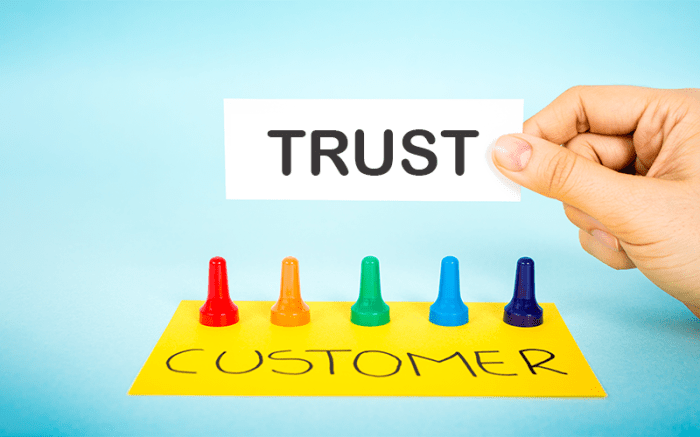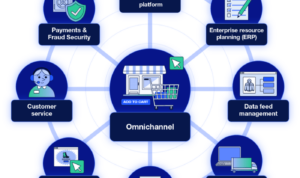Building Customer Trust Online sets the foundation for business success in the digital age, exploring key strategies and insights to foster lasting relationships with customers. From transparent communication to data security, this guide covers it all.
Importance of Building Customer Trust Online
Building customer trust online is crucial for businesses in today’s digital age. With the growing number of online transactions, customers need to feel confident that their information is secure and that they are dealing with a reputable company. Trust plays a significant role in customer loyalty and retention, as it can lead to repeat business and positive word-of-mouth referrals.
Impact on Customer Loyalty
Building trust with customers can result in increased loyalty, as they are more likely to return to a business they trust. This loyalty can lead to higher customer lifetime value and a stronger customer base. For example, when customers trust an online retailer to deliver quality products on time, they are more likely to make repeat purchases and recommend the store to others.
Correlation with Online Sales, Building Customer Trust Online
Studies have shown a direct correlation between customer trust and online sales. According to a survey by BrightLocal, 84% of people trust online reviews as much as personal recommendations. This demonstrates the importance of building trust through positive reviews, transparent policies, and secure payment options. Businesses that prioritize building customer trust online are more likely to see an increase in sales and revenue.
Strategies for Building Customer Trust Online
Building trust online is crucial for any business looking to succeed in the digital world. Here are some key strategies to help establish and maintain trust with your customers:
Transparent Communication
Transparent communication is essential in building trust with customers. Be honest about your products, services, and policies. Provide clear and accurate information to help customers make informed decisions.
Social Proof
Utilize social proof to build credibility and trust. Showcase customer reviews, testimonials, and endorsements on your website. This can reassure potential customers and demonstrate the positive experiences of others.
Secure Payment Options
Offering secure payment options is vital for gaining customer trust. Implementing encryption technology and displaying trust badges can help customers feel confident in sharing their financial information.
Personalized Customer Experiences
Personalizing customer experiences can go a long way in building trust. Tailor your interactions, recommendations, and communications based on customer preferences and behavior. This shows that you value their individual needs and preferences.
Building Trust through Website Design

In the digital age, where first impressions are often made online, the design of your website plays a crucial role in building trust with your customers. A well-designed website can convey professionalism, credibility, and reliability, ultimately leading to increased trust and customer loyalty.
Clear Navigation and Professional Aesthetics
When a customer lands on your website, they should be able to easily navigate through the pages to find what they are looking for. Clear and intuitive navigation not only enhances the user experience but also instills a sense of trust in your brand. Additionally, professional aesthetics, including cohesive color schemes, high-quality images, and clean layouts, can make your website appear more trustworthy and reputable.
Importance of Mobile Responsiveness and Site Speed
In today’s mobile-driven world, having a responsive website that adapts seamlessly to different screen sizes is essential. A mobile-friendly design not only improves user experience but also signals to customers that you are up-to-date with technology trends. Furthermore, site speed is a crucial factor in building trust online, as slow-loading pages can frustrate users and lead them to question the reliability of your website.
Tips for Creating Trust Badges, Secure Checkout Processes, and Privacy Policies
To further enhance trust on your website, consider incorporating trust badges from reputable security providers to assure customers that their information is safe and secure. Implementing secure checkout processes, such as SSL encryption and trusted payment gateways, can also instill confidence in customers to complete their transactions. Lastly, having a transparent privacy policy that clearly Artikels how customer data is collected, used, and protected can build trust and credibility with your audience.
Establishing Trust through Content and Communication

Building credibility and trust with customers through valuable content is essential in the digital age. By providing informative and relevant content, businesses can establish themselves as experts in their field, gaining the trust of their target audience.
Consistent Branding and Messaging
Consistency in branding and messaging plays a crucial role in gaining customer trust. When a brand maintains a consistent tone, visual identity, and messaging across all platforms, it helps to reinforce the brand’s image and build credibility with customers.
- Create a style guide: Developing a comprehensive style guide that Artikels the brand’s voice, tone, and visual identity can help ensure consistency across all content and communication channels.
- Use the same language: Utilize consistent language and messaging in all customer interactions, whether it’s through social media, email marketing, or website content.
- Align with brand values: Ensure that all content and communication align with the brand’s core values and mission, reinforcing trust and credibility with customers.
Engaging Customers through Social Media
Social media provides a valuable platform for businesses to engage with customers and build trust through authentic interactions. Responding to customer feedback promptly and transparently can help foster a sense of trust and loyalty among your audience.
- Respond to comments and messages: Engage with customers by responding to their comments, messages, and inquiries in a timely and personalized manner.
- Create valuable content: Share informative and engaging content on social media platforms to provide value to your audience and establish your expertise in the industry.
- Encourage user-generated content: Encourage customers to share their experiences and feedback on social media, showcasing authentic testimonials and building social proof.
Building Trust through Data Security and Privacy: Building Customer Trust Online
In today’s digital age, where data breaches and privacy concerns are on the rise, ensuring data security and privacy is crucial for businesses looking to build trust with their customers. By implementing robust data security measures and being transparent about how data is collected and used, businesses can establish a sense of trust and credibility with their customers.
The Importance of Data Security Measures
- Protecting customer data from cyber threats and unauthorized access.
- Preventing data breaches and maintaining the confidentiality of sensitive information.
- Building a reputation as a trustworthy and responsible business.
Transparency in Data Collection and Usage
- Clearly communicating to customers what data is being collected and for what purpose.
- Providing opt-in mechanisms for data collection to give customers control over their information.
- Being open and honest about how data is stored, processed, and shared.
Role of GDPR Compliance and Privacy Policies
- Ensuring compliance with data protection regulations such as GDPR to safeguard customer data.
- Implementing privacy policies that Artikel how data is handled and protected.
- Giving customers the assurance that their privacy rights are respected and upheld.





